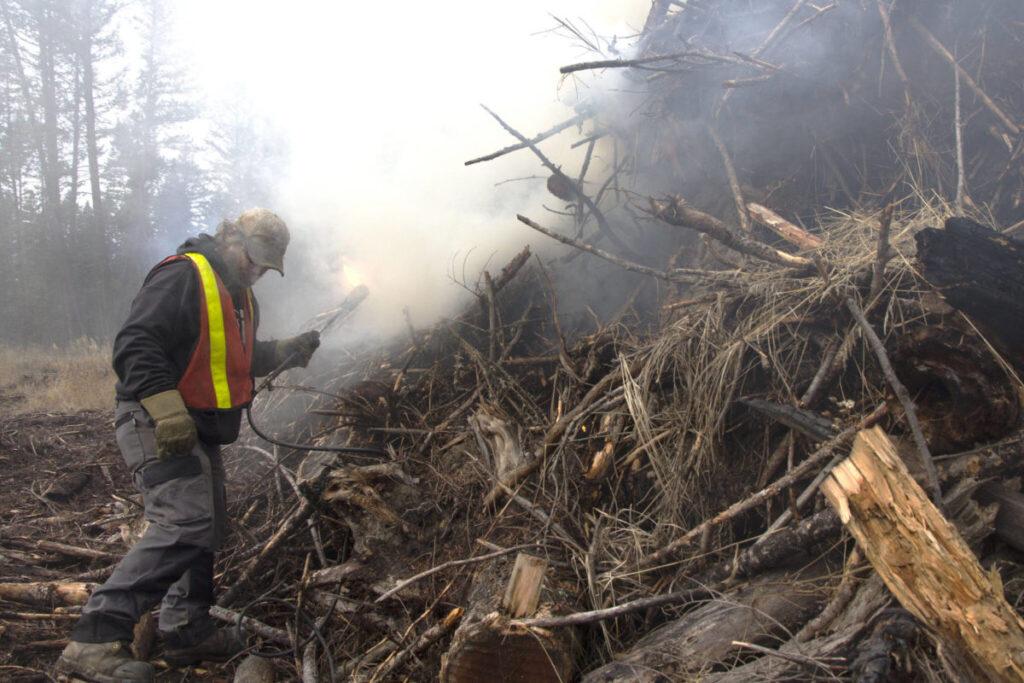Turning Forest Waste Wood into Sustainable Materials
BEAVER COVE, B.C.—Salvaging fibre isn’t a new activity on Northern Vancouver Island, but the economics of this activity are difficult. Most wood waste is not close to chipping facilities, therefore access and transportation can be challenging and often uneconomic.
In 2019, the Forest Enhancement Society of BC (FESBC) provided close to $375,000 in funding to Kurt Leroy Trucking to develop fibre salvage and recovery projects in partnership with Western Forest Products Ltd. and Atli Chip Limited Partnership (LP).
Leroy said the funding “enabled us to salvage waste wood volumes that would normally be outside the economic range from the chip plant and to recover wood that would normally have to be burned.”

Waste pile waiting to be burned or salvaged. Photo Credit Atli Chip LP 
Keith Bleeker lights a pile of fuel at the 100 Mile District Community Forest
He notes the funding also supported his trucking company to maintain employment over a much broader range throughout northern Vancouver Island.
The focus of these projects was to extend the economic range to recover more fibre and deliver it to Atli Chip for processing. Without this partnership, the fibre would normally be burned in piles, thereby contributing to greenhouse gas emissions.
The current project is planning to produce approximately 23,000 cubic metres of salvage wood from two local tree farm licences. This is approximately 500 logging truck loads of fibre that would otherwise be uneconomic to transport and be burned on site to reduce wildfire risk. 500 logging truck loads equates to removing 830 vehicles from the roads for a year in terms of greenhouse gas reduction.
The Atli Chip facility at Beaver Cove is a limited partnership between Atli Resources LP, Paper Excellence Canada and Wahkash Contracting Ltd. Atli Resources LP is the forestry arm of the ‘Namgis First Nation.
“We are very excited about the opportunity for Atli Chip to meet the growing needs of the industry and to acquire a business that we believe will have long-term employment, economic and environmental benefits for the ‘Namgis people and the North Island as a whole,” said Don Svanvik, ‘Namgis Chief Councillor. “The chip plant has hired some ‘Namgis members and is looking to hire more, as well as train some of our youth. The FESBC funding has assisted in the creation of the second shift at the chip plant—increasing employment.”
Quinton Hayward, Chief Forester, Paper Excellence notes that Atli chips are made from logging waste produced by local logging operations and dryland sorts and includes treetops, broken logs, and wood chunks.
“Turning this material into chips reduces the amount of fibre left behind after primary forest harvesting. This results in better utilization of the forest resources and a net carbon reduction,” said Hayward.
Atli Chip produces a high-quality chip product from multiple lengths of low-quality wood waste.
“This means we can serve a key role in reducing the amount of residual fibre often left behind after primary forest harvesting,” said Doug Mosher, RFP, Chief Executive Officer, Atli Chip.
“The FESBC funding has been critical in expanding the salvage range, helping to avoid burning of the waste wood piles which results in less smoke and carbon emissions. We have also expanded employment options at the chip plant, for salvagers and related services.”
Atli Chip loaded and delivered the first barge of chips to Paper Excellence in May 2021. The chips are used to produce a variety of valuable consumer goods—many of which we use in our daily lives.
“These types of collaborative partnerships benefit all British Columbians,” said Dave Conly, RPF, Operations Manager, FESBC. “We are supporting local jobs on Vancouver Island while supporting environmentally sustainable consumer products and taking strong action on climate change.”
“One of the key aspects of this project is we are now utilizing wood that would otherwise be burnt in residual slash piles. This leads to an overall reduction in greenhouse gas emissions and is an important part of our work to address climate change.”
For an interview with FESBC or Atli Chip contact:
Aleece Laird, Communications Liaison | communications@fesbc.ca | 250.574.0221
